


In the rapidly evolving landscape of clinical research, the ability to analyze data effectively can be the decisive factor between success and stagnation. As organizations strive to bring innovative medical technologies to market, understanding the nuances of clinical study data analysis is paramount. This article explores ten key insights that illuminate the critical role of data analysis in enhancing research outcomes, while also addressing the challenges and opportunities that lie ahead.
How can stakeholders harness these insights to streamline their processes and elevate the quality of patient care in an increasingly competitive environment?
bioaccess® strategically leverages its presence in Latin America, particularly in Colombia, to significantly accelerate research processes. Colombia stands out with remarkable advantages, including cost savings exceeding 30% compared to North America and Western Europe, alongside a regulatory review process that typically spans just 90-120 days. Furthermore, investments in science, technology, and innovation projects benefit from R&D tax incentives, enhancing Colombia's attractiveness for medical device companies.
By capitalizing on these local regulatory efficiencies and the diverse patient demographics of a population surpassing 50 million, bioaccess® achieves ethical approvals in an impressive 4-6 weeks, with patient enrollment occurring 50% faster than in traditional markets. This agility not only accelerates the development of Medtech innovations but also boosts the efficiency of clinical study data analysis, facilitating quicker market access for transformative medical technologies. Moreover, Colombia's healthcare system is highly esteemed, ranking among the top five worldwide, which underscores the high standards of clinical study data analysis carried out in the region.
In a landscape where the average duration for ethical approvals globally can extend beyond several months, bioaccess® distinguishes itself as a frontrunner in promoting swift progress in medical studies. This is illustrated by successful partnerships, such as with Welwaze Medical Inc. for the Celbrea® launch, which have set new standards in the field. As you consider your own challenges in clinical research, think about how bioaccess® can help you navigate these complexities and achieve your goals.
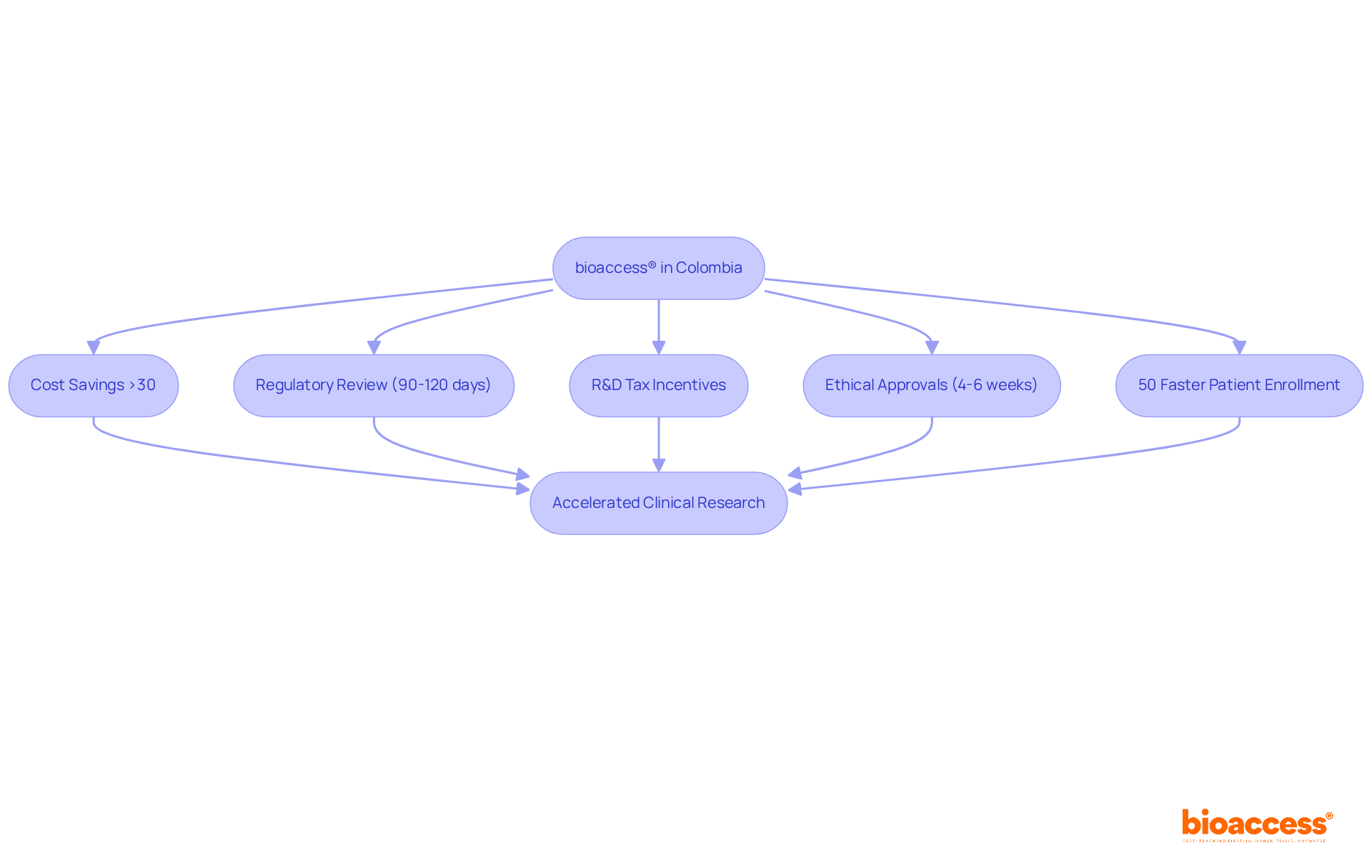
Clinical study data analysis has fundamentally transformed medical studies, empowering researchers to extract actionable insights from extensive datasets. By leveraging advanced statistical techniques and machine learning algorithms, investigators can perform clinical study data analysis to uncover patterns, predict outcomes, and make informed decisions that significantly enhance study quality. This evolution streamlines trial processes, reduces costs, and improves patient outcomes, driving innovation within the Medtech sector.
Notably, bioaccess® has proven its capability to enroll treatment-naive cardiology or neurology cohorts 50% faster than traditional Western sites, achieving savings of $25K per patient with FDA-ready data-no rework, no delays. Furthermore, partnerships like that of GlobalCare Clinical Trials with bioaccess™ underscore the effectiveness of these solutions, achieving over a 50% reduction in recruitment time and a retention rate exceeding 95%. As the landscape of medical research continues to evolve, the strategic application of clinical study data analysis will remain crucial in advancing the Medtech sector.

Artificial intelligence (AI) is revolutionizing the field of clinical study data analysis, significantly boosting both efficiency and accuracy. By automating information cleaning processes, AI algorithms swiftly identify anomalies and facilitate real-time monitoring, which minimizes the time researchers spend on manual tasks. Hospitals that implement AI-driven solutions report an impressive return on investment of $3.20 for every $1 spent, often realized within just 14 months. This efficiency in clinical study data analysis leads to faster data processing, which enables quicker insights and more timely decision-making.
As a result, studies can accelerate the development of new therapies. For instance, bioaccess® allows treatment-naive cardiology or neurology groups to enroll 50% faster than their Western counterparts, achieving savings of $25K per patient with FDA-ready data-no rework, no delays. Furthermore, bioaccess® offers comprehensive research study management services, including:
These services collectively enhance the overall quality of outcomes.
Industry leaders recognize that AI not only enhances operational efficiency but also improves the overall quality of health outcomes, making it an indispensable tool in clinical study data analysis in modern research. As we move forward, collaboration among stakeholders will be crucial in harnessing the full potential of AI in clinical research.
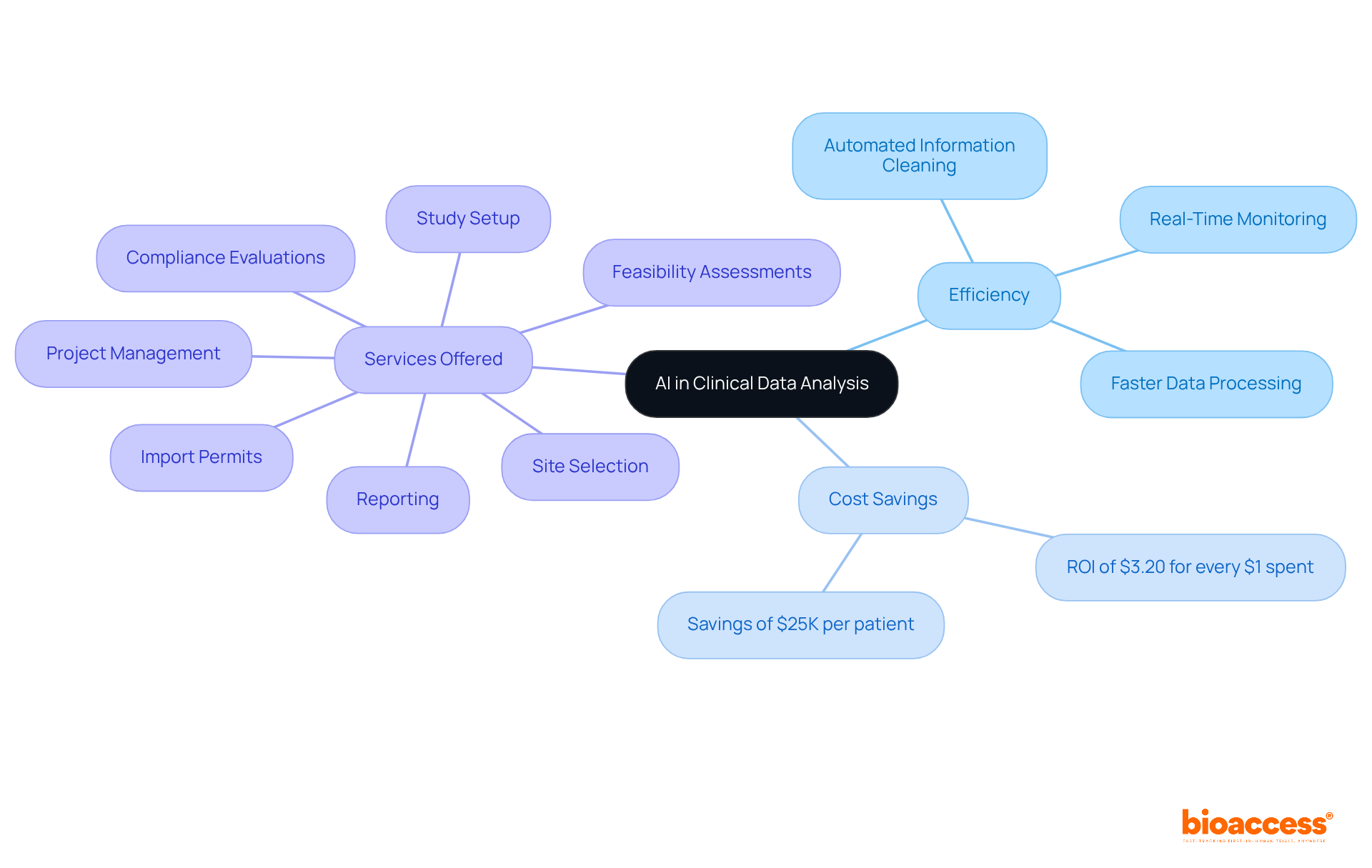
Real-world information (RWI) is essential for a comprehensive understanding of patient outcomes that extend beyond the confines of regulated clinical studies. By harnessing data from everyday healthcare practices, researchers can reveal vital insights into treatment effectiveness, patient adherence, and long-term health outcomes. For example, studies indicate that integrating patient-reported outcomes (PROs) into standard cancer care can significantly enhance survival rates. One study demonstrated that patients receiving PRO monitoring had a notably better median overall survival compared to those who received conventional care.
Moreover, the FDA's increasing reliance on real-world data (RWD) for drug approvals underscores its critical role in shaping trial designs that align with actual patient needs. This approach not only elevates the relevance of new therapies but also ensures that medical studies are more attuned to the real challenges faced by patients. Ultimately, this focus on RWI promotes improved health outcomes, making it clear that collaboration among stakeholders is vital for advancing clinical research and patient care.
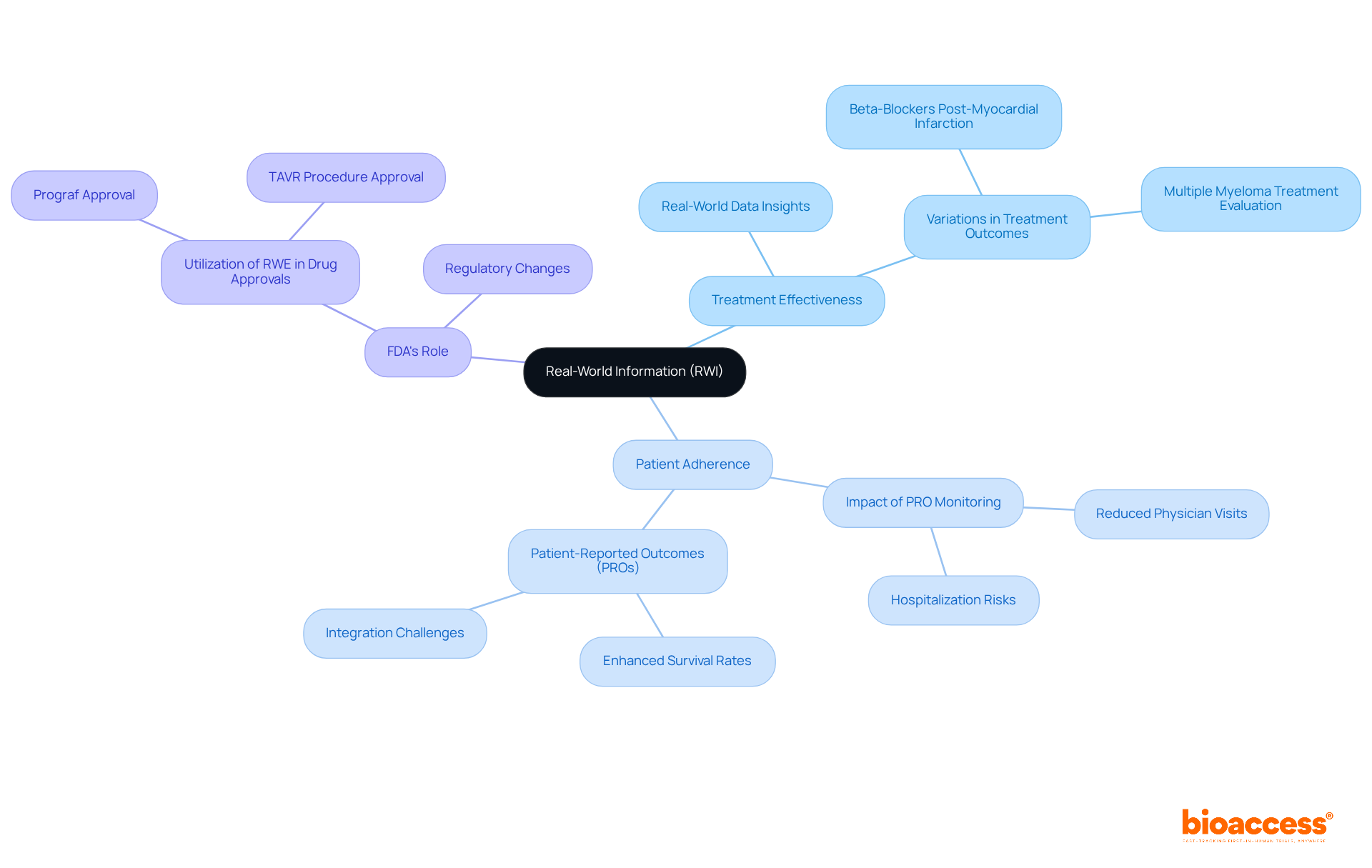
Navigating the regulatory environment is crucial for health studies. Compliance with strict guidelines established by regulatory authorities guarantees the safety and effectiveness of new therapies. In 2025, researchers must stay updated on evolving regulations, including the FDA's 21 CFR Part 11, which governs electronic records and signatures. This regulation emphasizes the need for system validation and detailed audit trails. Compliance with these regulations not only mitigates risks but also enhances the credibility of research findings.
At bioaccess, our extensive research management services encompass:
This comprehensive approach is essential for advancing medical device evaluations, particularly in managing the intricacies of regulatory compliance. Recent statistics reveal that 59% of professionals believe rapid regulatory changes will significantly impact their work in the next five years. This underscores the necessity for medical researchers to remain vigilant and proactive in understanding compliance requirements. Furthermore, 70% of corporate risk and compliance experts have shifted towards a more strategic method for compliance, recognizing its importance in fostering a culture of integrity within clinical studies.
Expert insights highlight the significance of ethical trials. As noted by a regulatory expert, "Most physicians and patients do not fully understand the uncertainties surrounding the safety and effectiveness of FDA-approved products." This statement emphasizes the need for transparency and informed consent in the research process. Successful examples of ethical approvals can be observed in organizations that have effectively implemented role-specific compliance training, leading to improved adherence to regulations and ethical standards. By leveraging technology and best practices, researchers can navigate the complexities of compliance, ensuring that their studies not only meet regulatory requirements but also contribute positively to patient safety and public trust.
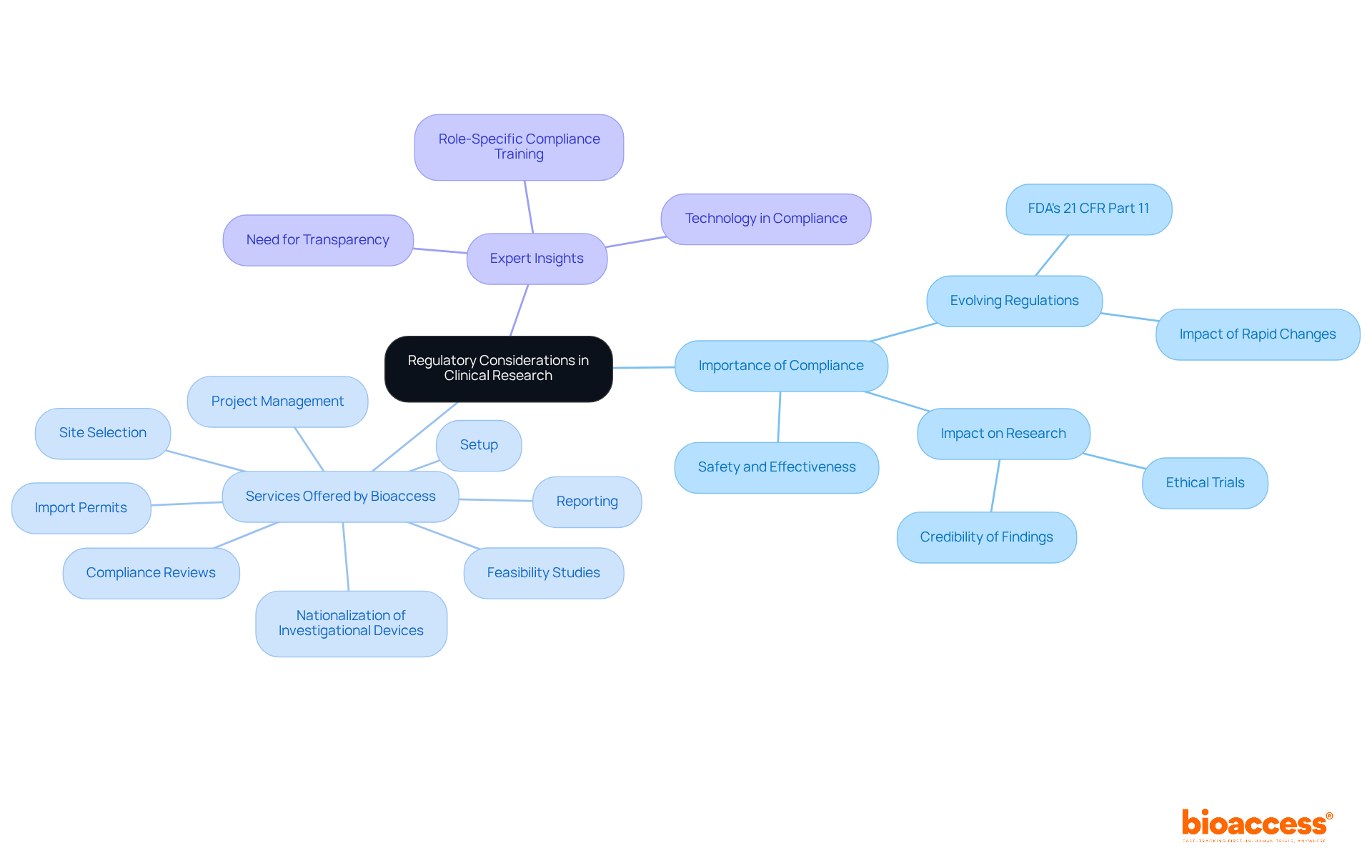
Biostatistics serves as the cornerstone of interpreting medical information, offering essential tools for clinical study data analysis to analyze complex datasets and extract meaningful insights. By employing statistical methods, researchers can evaluate the significance of their findings, control for confounding variables, and ensure their results are both robust and reliable. This comprehensive approach to clinical study data analysis is vital for validating the effectiveness of new therapies and informing medical practice.
In the realm of medical trials, particularly those conducted by bioaccess®, which encompass:
the integration of extensive trial management services - such as feasibility studies, site selection, compliance reviews, trial setup, and project management - greatly enhances the reliability of clinical study data analysis. With over 20 years of experience in Medtech, bioaccess® ensures that the clinical study data analysis conducted during studies is not only statistically valid but also adheres to regulatory standards, thereby boosting the overall success of research initiatives.
As you consider the challenges in clinical research, think about how a partnership with bioaccess® could streamline your processes and improve outcomes. The collaboration between biostatistics and comprehensive trial management is essential for advancing medical innovation through effective clinical study data analysis.

Information management in medical studies poses significant challenges, such as entry errors, inconsistent formats, and security issues. Addressing these concerns is crucial for ensuring information integrity, which demands robust processes for collection, validation, and monitoring. Bioaccess stands out by offering extensive trial management services that incorporate:
This encompasses thorough reviews and feedback on study documents, as well as detailed reporting on both serious and non-serious adverse events.
To mitigate these challenges, researchers must implement best practices like:
Such measures are vital for maintaining the quality of information throughout the study lifecycle. Industry leaders emphasize that information integrity is essential for informed decision-making and accountability in health-related research. By prioritizing these practices, researchers can ensure high-quality information, ultimately leading to more reliable outcomes and advancements in medical innovation.
In the ever-evolving Medtech landscape, collaboration is key. By working together and leveraging the expertise of organizations like Bioaccess, researchers can navigate the complexities of clinical trials and enhance their clinical study data analysis more effectively. The next steps involve embracing these practices and fostering partnerships that enhance the integrity and quality of research.
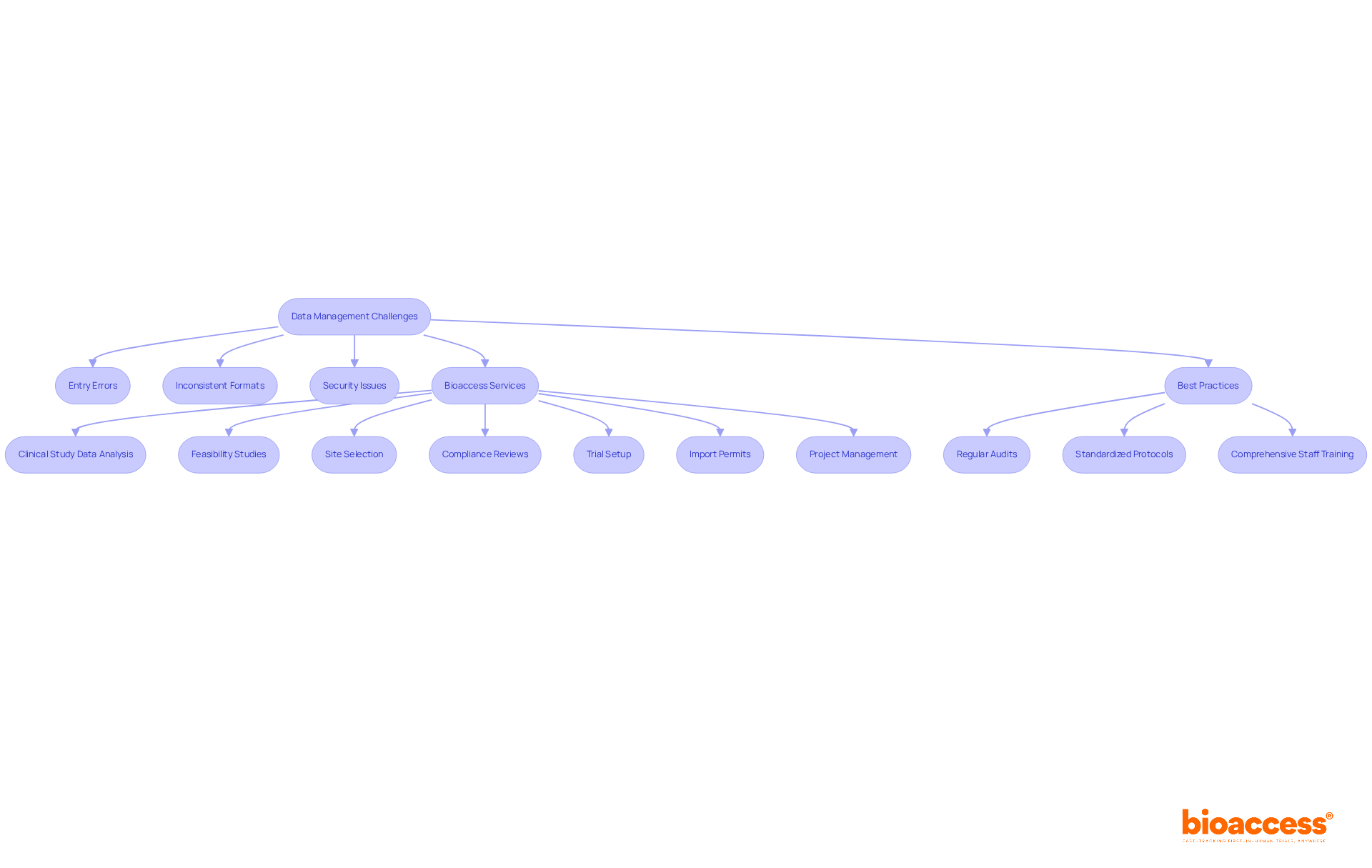
Technological advancements are reshaping the landscape of healthcare information analysis, especially in clinical study data analysis, by introducing tools that significantly enhance efficiency and precision. Innovations like cloud computing, extensive analytics, and advanced visualization techniques empower researchers to enhance clinical study data analysis of large datasets more effectively. These technologies not only streamline clinical study data analysis but also provide real-time insights, allowing for more flexible decision-making in research studies.
In the realm of medical device research, particularly those managed by bioaccess in Latin America, the integration of these technologies is essential. With a focus on comprehensive research management services - including feasibility studies, site selection, compliance reviews, study setup, import permits, project management, and reporting - bioaccess leverages over 20 years of expertise to ensure successful outcomes in:
This holistic approach not only enhances the effectiveness of medical studies but also contributes to local economies through job creation, economic development, and improved healthcare outcomes.
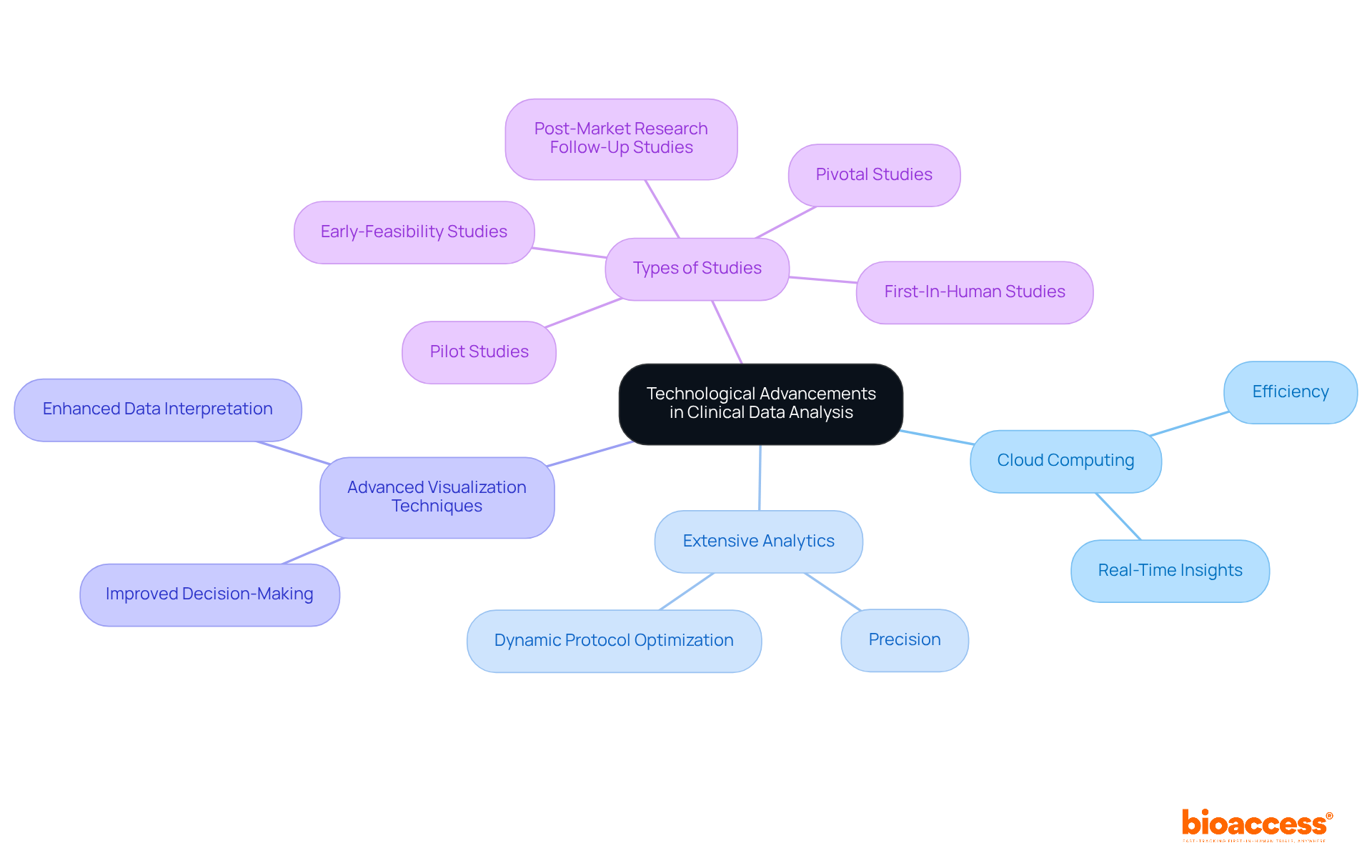
Cooperation stands as a cornerstone of successful medical study outcomes. By fostering collaborations among researchers, sponsors, and regulatory organizations, clinical trials can leverage clinical study data analysis to tap into a wealth of expertise and resources. For example, bioaccess™ has partnered with Welwaze Medical Inc. to facilitate the launch of the innovative Celbrea® medical device in Colombia. This collaboration exemplifies how strategic alliances can enhance regulatory access and market entry, showcasing the potential of teamwork in the Medtech landscape.
Effective communication and collaboration not only streamline the investigation process but also lead to innovative solutions and improved patient outcomes. Joint initiatives, such as those between bioaccess™ and Caribbean Health Group, promote the exchange of knowledge and best practices, further advancing research in healthcare. This comprehensive approach, which includes:
is essential for navigating the challenges faced by medical device startups in clinical study data analysis during research trials.
In a rapidly evolving Medtech environment, the importance of collaboration cannot be overstated. As organizations face increasing complexities in clinical research, effective clinical study data analysis through strategic partnerships becomes vital. By leveraging collective expertise, stakeholders can address key challenges more effectively, ensuring that innovative solutions reach the market swiftly and safely. The call to action is clear: embrace collaboration to enhance the future of medical research.
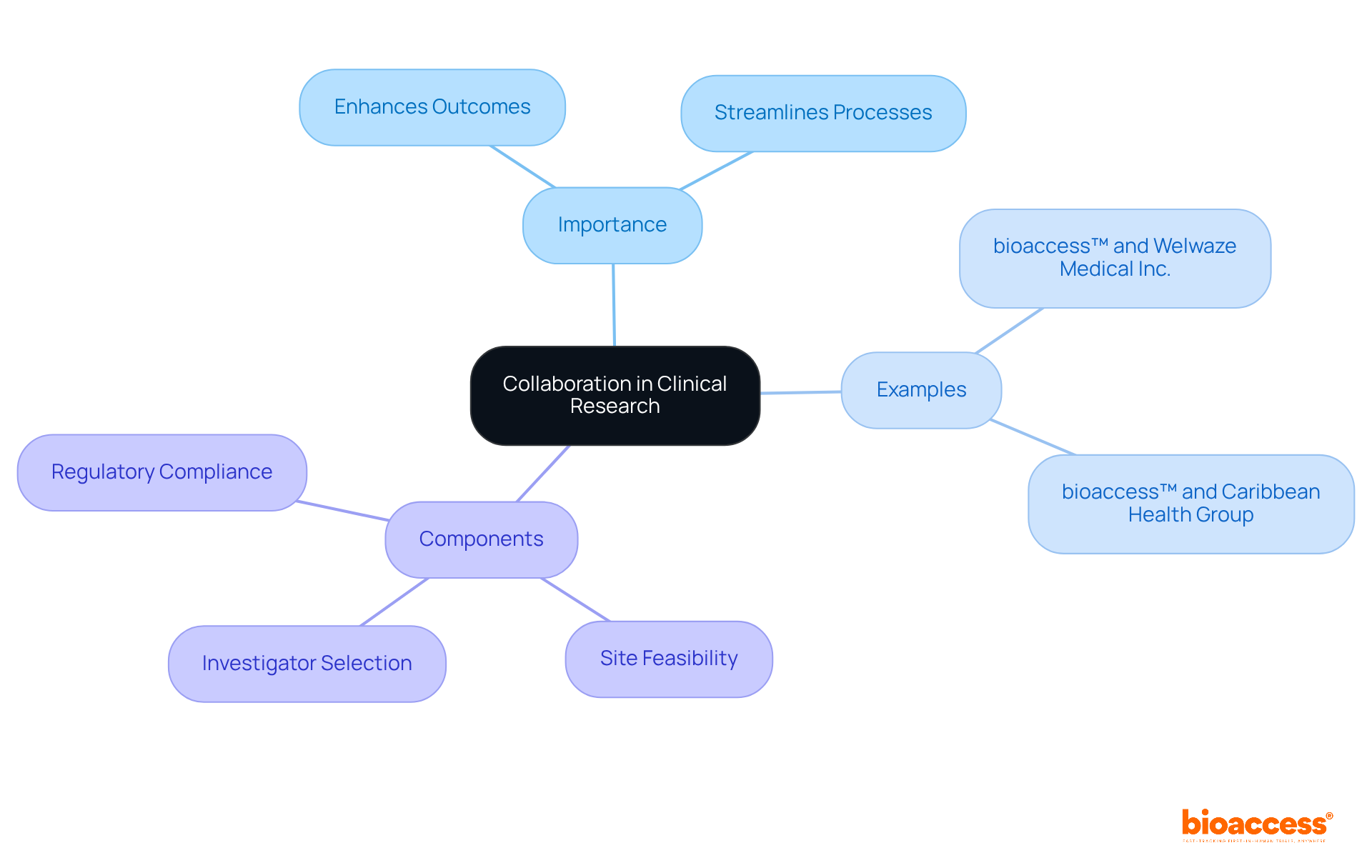
The future of clinical study data analysis is poised for a significant transformation through the integration of artificial intelligence (AI) and machine learning (ML). These cutting-edge technologies are enhancing information processing capabilities and enabling more sophisticated analyses, such as clinical study data analysis, along with predictive modeling that can lead to improved patient outcomes. For instance, AI-driven site selection can boost participant enrollment by 10 to 15 percent, while predictive analytics can streamline eligibility design and optimize patient groups.
As the emphasis on real-world evidence intensifies, researchers must adopt comprehensive data collection methods for clinical study data analysis that capture diverse patient experiences. This shift is essential, aligning with evolving regulatory landscapes that increasingly favor insights derived from clinical study data analysis. Regulatory bodies, including the FDA, are advocating for AI-driven models to modernize drug development, which emphasizes the role of clinical study data analysis in the broader movement towards innovation in trial processes.
Thought leaders in the field highlight the critical importance of responsible AI development. Satya Nadella, CEO of Microsoft, asserts that AI must be developed ethically to tackle complex global challenges. Meanwhile, Sheryl Sandberg champions collaboration between human creativity and AI's analytical prowess to address pressing issues such as healthcare and climate change.
Instances of AI's impact are already evident in clinical study data analysis within medical research. For example, Bayer has harnessed machine learning to streamline adverse event reporting, significantly reducing processing times and enhancing data accuracy. Furthermore, AI applications are projected to expand from USD 1.5 billion in 2022 to USD 4.8 billion by 2027, highlighting the growing reliance on these technologies for clinical study data analysis.
As we approach 2025, the integration of AI and ML will not only revolutionize medical research but also necessitate a commitment to transparency and ethical standards. Organizations must prioritize robust data management strategies to ensure the effectiveness of AI applications, which ultimately enhances clinical study data analysis for more efficient and patient-centric clinical trials.
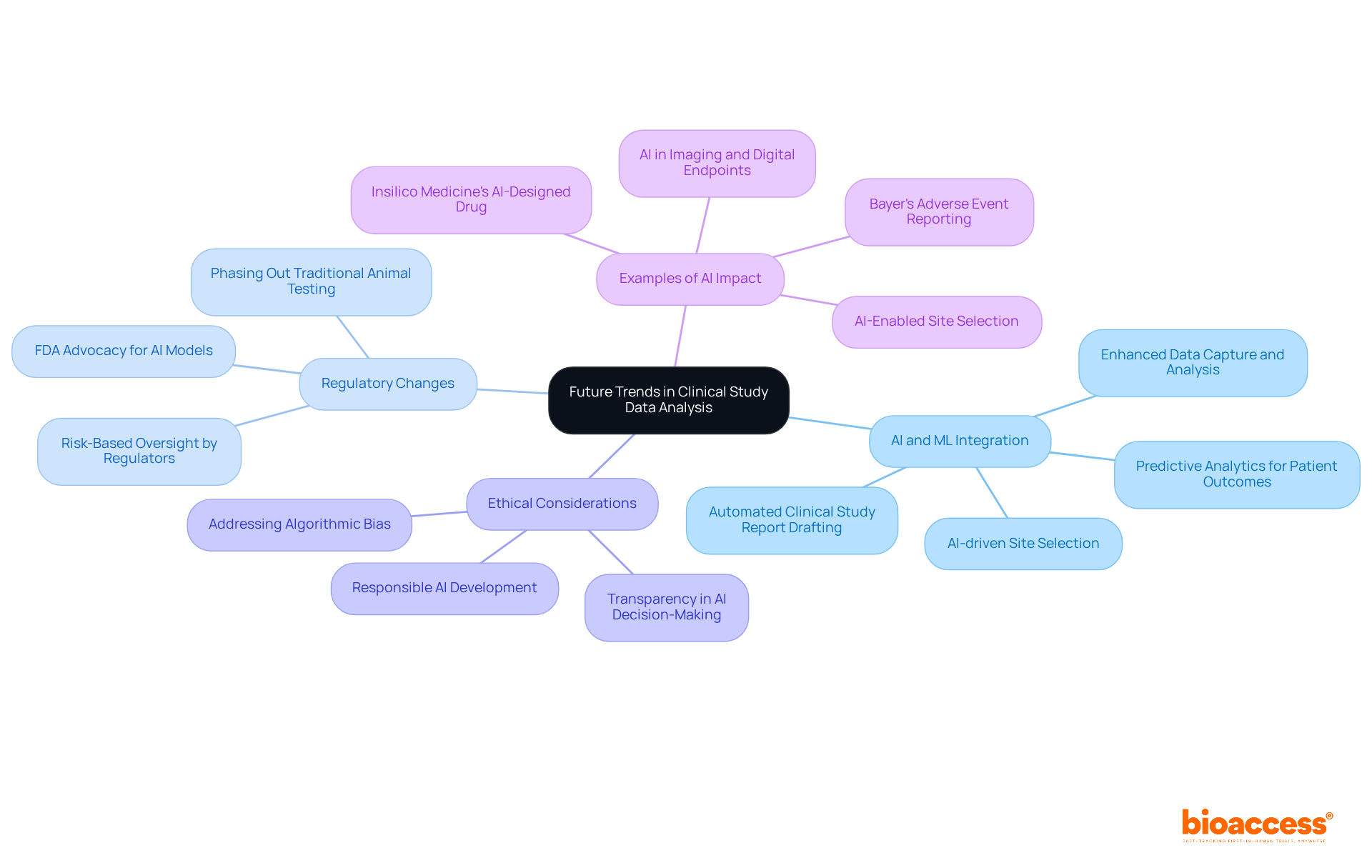
The landscape of clinical study data analysis is rapidly evolving, driven by advancements in technology, regulatory adaptations, and a growing emphasis on collaboration. This evolution underscores the necessity of adopting innovative strategies to enhance the efficiency and effectiveness of clinical trials. By leveraging tools such as artificial intelligence, biostatistics, and real-world data, researchers can significantly improve patient outcomes and streamline processes.
Key insights outlined in the article highlight the advantages of conducting clinical research in regions like Colombia, where bioaccess® accelerates timelines for ethical approvals and patient enrollment. The integration of AI not only automates data management but also enhances the quality of insights derived from complex datasets. Furthermore, the emphasis on real-world evidence underscores the necessity of aligning clinical studies with actual patient experiences, ensuring that new therapies are relevant and effective.
As the field continues to advance, embracing collaboration among stakeholders becomes crucial. By fostering partnerships and sharing knowledge, researchers can navigate the complexities of clinical trials more effectively. The call to action is clear: prioritize innovative practices and collaborative approaches to drive the future of clinical research, ultimately leading to enhanced patient care and successful medical innovations.
What advantages does bioaccess® offer for clinical research in Colombia?
bioaccess® offers significant advantages, including cost savings exceeding 30% compared to North America and Western Europe, a regulatory review process that typically spans just 90-120 days, and R&D tax incentives for science and technology projects.
How quickly can bioaccess® achieve ethical approvals for clinical studies?
bioaccess® can achieve ethical approvals in an impressive 4-6 weeks.
How does patient enrollment speed compare between bioaccess® and traditional markets?
Patient enrollment through bioaccess® occurs 50% faster than in traditional markets.
What is the significance of Colombia's healthcare system in clinical research?
Colombia's healthcare system is highly esteemed, ranking among the top five worldwide, which underscores the high standards of clinical study data analysis conducted in the region.
How does clinical study data analysis enhance medical studies?
Clinical study data analysis empowers researchers to extract actionable insights, uncover patterns, predict outcomes, and make informed decisions, significantly enhancing study quality and driving innovation in the Medtech sector.
What cost savings can be achieved through bioaccess®'s clinical study data analysis?
bioaccess® can achieve savings of $25K per patient with FDA-ready data, with no rework and no delays.
What role does artificial intelligence (AI) play in clinical data analysis?
AI enhances efficiency and accuracy in clinical study data analysis by automating information cleaning processes, identifying anomalies, and facilitating real-time monitoring, leading to faster data processing and quicker insights.
What services does bioaccess® provide for research study management?
bioaccess® offers comprehensive research study management services, including feasibility assessments, site selection, compliance evaluations, study setup, import permits, project management, and reporting.
How do partnerships, like that of GlobalCare Clinical Trials with bioaccess®, improve clinical research outcomes?
Partnerships have achieved over a 50% reduction in recruitment time and a retention rate exceeding 95%, demonstrating the effectiveness of bioaccess®'s solutions in clinical research.